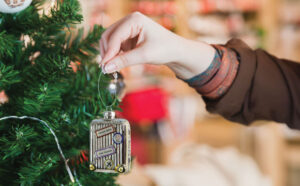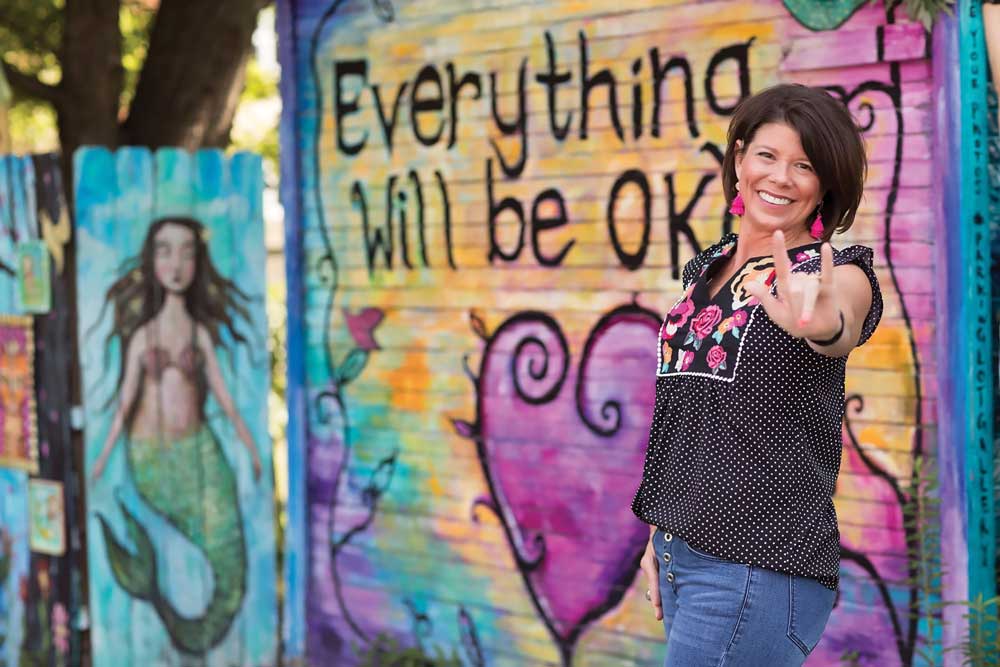
Photo courtesy of Kari Bedford
Philanthropist, humanitarian, high-energy small business owner, dedicated wife and mother of two daughters, Michelle Tjelmeland of Springfield deftly juggles multiple roles aimed at bringing beauty and healing to the lives of others, all while dealing with the twists and turns in her own life.
As a 7th and 8th grade language arts teacher in 1998, Michelle became profoundly deaf while pregnant with her daughter, Ellie. And, after giving birth, mother’s intuition told her something also wasn’t right with her newborn.
“Back then, Illinois hospitals didn’t do newborn hearing screenings,” Michelle says. “We went to nine different doctors, and they all said Ellie passed her hearing test. I wasn’t satisfied.”
Michelle and her husband Joel scheduled an appointment with hearing specialist Dr. Charles Berlin in New Orleans, La. He pronounced Ellie profoundly deaf.
They then turned to Carle Clinic’s ECHO (Expanding Children’s Hearing Opportunities) program in Champaign. Ellie was prescribed hearing aids as a required insurance precursor to other options. She was fitted with the aids to determine if they could help.
After 8 long months, Ellie’s doctors, audiologist and speech therapist agreed the hearing aids were not beneficial. However, they believed she would be a good candidate for a cochlear implant. The Tjelmelands had been doing research about implants and read numerous books and materials. They were both excited and scared. Their hope was that Ellie would receive enough sound to be able to learn to speak, but they knew it would be a long road ahead.
“Acutely aware of the importance of language skills in day-to-day life, I didn’t want Ellie to struggle,” Michelle says.
Approved for an implant in August 1999, Ellie underwent surgery to place the device. At 18 months old, she was one of the youngest patients to ever receive one. After a month of recovery, the Tjelmelands returned to have the implant hooked up. The implant was successful, and over time, Ellie was enrolled in preschool to learn to listen, speak and socialize with her peers. She received extra help during her school day and attended speech, language, listening, lip reading and sign language therapy five days a week.
Michelle stresses that cochlear implants are not for everyone, and she respects all opinions regarding them. It made sense for her family because everyone used speech to communicate. However, if the procedure wasn’t successful, they were prepared to learn sign language, lip reading, etc.
At the same time, Michelle was struggling with her own loss of hearing and identity as a teacher. Always a social person, she began to isolate herself. “I was dealing with the loss of my child’s hearing and my career, and I couldn’t communicate,” she explains. She was so focused on Ellie that she felt selfish trying to help herself.
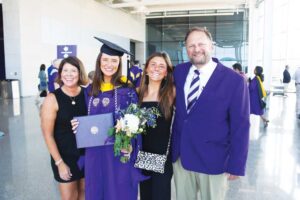
Michelle learned that the University of Illinois Urbana-Champaign offered an online computer technology course and enrolled. She went on to receive her master’s degree in education and computer technology and launched her own web design business. She has since worked with hundreds of businesses and organizations to develop new and professional marketing materials.
After a long battle with her insurance company, Michelle underwent cochlear implant surgery herself. “Insurance providers considered cochlear implants an elective procedure,” says Michelle. “I had to appeal multiple times before they eventually paid.”
In 2005, Michelle and Ellie became the first mother-daughter pair to receive bilateral implants. “My decision to be implanted may have been easier, because I saw the benefits Ellie was receiving,” says Michelle. “It was the greatest gift — the implant gave me back my life. I can hear, speak and listen, but even with implants, they are not perfect.”
According to Michelle, a cochlear implant is revolutionary for people who cannot hear, but it doesn’t work for everyone. It is a small, complex electronic device that can help to provide a sense of sound to a person who is profoundly deaf or hearing impaired. It does not restore normal hearing. Instead, it can give a deaf person a useful representation of sounds in the environment and help him or her understand speech.
Her life experience with cochlear implants motivated Michelle in 2005 to found the Cochlear Implant Awareness Foundation (CIAF), a nonprofit organization that provides information and resources for individuals who can overcome deafness through cochlear-implant technology. CIAF has nationwide name recognition because of Michelle’s intuitive marketing skills and sheer determination.
“CIAF is the only foundation like it in the world,” says Michelle. As manufacturers of cochlear implants create new variations, users often find themselves unable to obtain parts for the implants they have, and that is one place where the foundation comes into play. In addition, upgrading or replacing parts is often not economically feasible.
Through its “Hear Again” campaign, CIAF accepts gently used cochlear implant equipment from individuals who are upgrading. Gently used cables, processors, batteries, etc., are cleaned, processed and catalogued into a database. When a request for equipment is received, a search quickly finds the correct item. CIAF does not charge for the equipment, but there is a fee to help cover administrative costs. The foundation is 100% self-funded with no state or federal dollars received. It has helped provide millions of dollars’ worth of cochlear implant equipment to thousands of individuals across the U.S. and internationally.
Joan Carnduff, CIAF coordinator, handles equipment donations and requests, phone calls, inventory and shipping. “I couldn’t do this without her,” says Michelle. “I started CIAF, but Joan has taken it to the next level.”
Gratitude for the transformative power of the cochlear implant turned Michelle into a philanthropist and humanitarian, but another discovery at this point in her life also shaped the direction of her career. Michelle’s experience with hearing loss heightened her visual sensibilities. She became drawn to the visual appeal of her surroundings, from her home to her own wardrobe.
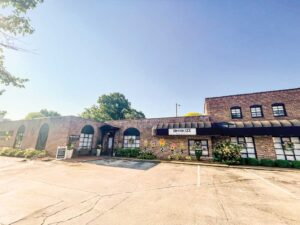
She says people would often comment on her eye for aesthetics, to which she would respond, “I guess I make up for my hearing loss with my sense of sight.” Her visual epiphany led to a new career path for her.
Michelle applied her aesthetic to fashion and more, creating Springfield’s District 23 Boutique in 2013. The boutique provides a consistent means to support the efforts of CIAF and serves the dual purposes of bringing beautiful apparel, accessories, home decor and gifts to the community, helping fund CIAF.
Through it all, Michelle remains a high-energy dynamo. She used the COVID-19 closure time to transform an unassuming bungalow into a highly sought-after rental property and has become a certified personal stylist, colorist and shape expert. She is also a certified social media specialist, community leader and public speaker.
Today, both of Michelle and Joel’s daughters are young adults. Lucy lives and works in Fort Lauderdale, Fla., and Ellie lives and works in Chicago and is engaged in post-graduate studies related to otorhinolaryngology. As for CIAF, it continues to grow and supports numerous individuals who are hearing challenged. To learn more, visit ciafonline.org.
Early intervention is key
According to the Illinois Department of Public Health (IDPH), since Dec. 31, 2002, progress has been made to screen every newborn in Illinois with 98% of infants born in Illinois hospitals receiving a hearing screen shortly after birth. If a newborn does not pass the screening, further testing by a pediatric audiologist is necessary to determine if the baby may have hearing loss.
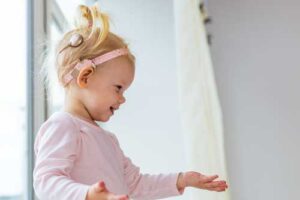 Some babies startle or turn their heads to a loud noise, but that doesn’t mean they can hear the spoken language. With the right support and early intervention, infants with hearing loss can experience healthy development. In Illinois, the Early Hearing Detection and Intervention (EHDI) program helps assure that care and follow-up intervention services are offered to families. If not detected, hearing loss can affect the child’s ability to communicate. Loss of hearing can impact academic achievement and social and emotional development.
Some babies startle or turn their heads to a loud noise, but that doesn’t mean they can hear the spoken language. With the right support and early intervention, infants with hearing loss can experience healthy development. In Illinois, the Early Hearing Detection and Intervention (EHDI) program helps assure that care and follow-up intervention services are offered to families. If not detected, hearing loss can affect the child’s ability to communicate. Loss of hearing can impact academic achievement and social and emotional development.
Hearing loss is the most frequently occurring birth defect, affecting up to three in 1,000 infants at birth and nine in 1,000 children by school age.









